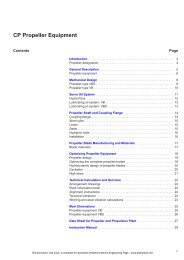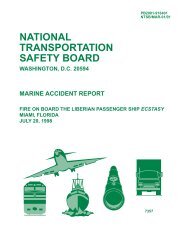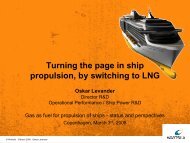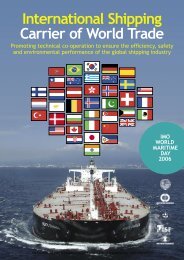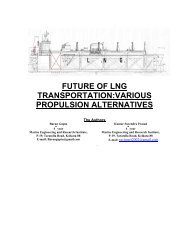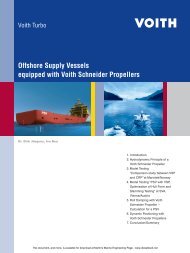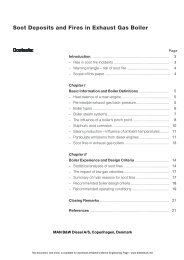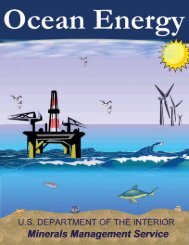Fuel Cells - Green Power - Martin's Marine Engineering Page
Fuel Cells - Green Power - Martin's Marine Engineering Page
Fuel Cells - Green Power - Martin's Marine Engineering Page
- No tags were found...
Create successful ePaper yourself
Turn your PDF publications into a flip-book with our unique Google optimized e-Paper software.
References:Peter Hoffmann. “The Forever <strong>Fuel</strong>:The Story of Hydrogen. Boulder:Westview Press,” 1981.James Cannon. “HarnessingHydrogen: The Key toSustainable Transportation.”New York: Inform, 1995.”Strategic Planning for the HydrogenEconomy: The HydrogenCommercialization Plan.”National Hydrogen Association.November, 1996.U.S. Department of Energy.Hydrogen Program Plan,FY 1993 - FY 1997.Richard G. Van Treuren. “Odorless,Colorless, Blameless.”Air & Space, May, 1997.National Hydrogen Associationhttp://www.ttcorp.com/nha/advocate/ad22zepp.htmResources:HyWeb http://www.HyWeb.deHydrogen InfoNethttp://www.eren.doe.gov/hydrogen/infonet.htmlThe New Sunshine Programhttp://www.aist.go.jp/nss/text/wenet.htmC.E. Thomas. Hydrogen VehicleSafety Report. NationalTechnical Information Service.U.S. Department of Commerce.Springfield, Virginia. July, 1997.While a single hydrogen production/distribution/storage system may not be appropriate for the diverseapplications of fuel cells, it is certainly possible that acombination of technologies could be employed to meetfuture needs. All of the system components are currentlyavailable — but cost effective delivery anddispensing of hydrogen fuel is essential. If hydrogenwere to become available and affordable, this wouldreduce the complexity and cost of fuel cell vehicles —enhancing the success of the technology.“Hydrogen Economy” is an energy system based uponhydrogen for energy storage, distribution, and utilization.The term, coined at General Motors in 1970,caught the imagination of the popular press. During theoil crisis in the early 70’s, the price of crude oil sharplyincreased, concern over stability of petroleum reservesand the potential lack of a secure energy source grew,and government and industry together developed plansand implementation strategies for the introduction ofhydrogen into a world energy system. However, thelessening of tensions in the Middle East led to a loweringof crude oil prices and the resumption of business asusual. Petroleum has continued to be the fuel of choicefor the transportation sector worldwide.Hydrogen fuel has the reputation of being unsafe.However, all fuels are inherently dangerous — howmuch thought do you give to the potential dangers ofgasoline when you drive your car? Proper engineering,education, and common sense reduce the risk in anypotentially explosive situation. A hydrogen vehicle andsupporting infrastructure can be engineered to be as safeas existing gasoline systems. Dealing with the perceptionand reality of safety will be critical to the successful wideintroduction of hydrogen into our energy economy.“Shell has established a Hydrogen Economy team dedicatedto investigate opportunities in hydrogen manufacturing andnew fuel cell technologies...”Chris Fay, Chief Executive, Shell UKThis document, and more, is available for download at <strong>Martin's</strong> <strong>Marine</strong> <strong>Engineering</strong> <strong>Page</strong> - www.dieselduck.net25



